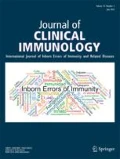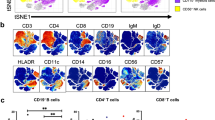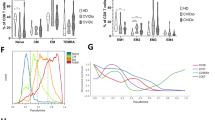Abstract
Purpose
DiGeorge syndrome has substantial heterogeneity with variable immune deficiency and dysregulation. Implicated immunopathology includes reduced thymic output and increased peripheral homeostatic proliferation with Th2 skewing and expansion of self-reactive cells. We hypothesized that T cell lymphopenia severity will be associated with higher odds of autoimmunity and/or asthma.
Methods
Using the US Immunodeficiency Network registry, we identified patients with 22q11.2 deletion (and/or TBX1). Initial absolute CD3+ T cell values were stratified: normal, 50–99% and below 50% of the lower limit of age-adjusted normal values. Patients with and without reported autoimmunity and asthma were compared using chi-square tests and multivariate logistic regression.
Results
Among 415 patients, autoimmunity was reported in 17 (4.1%), and asthma was reported in 28 (6.7%). Compared with those with no reported autoimmunity, patients with reported autoimmunity more frequently had low CD19+ B cells [3.3% (12/364) vs 28.6% (4/14); p = 0.002] and low IgG [6.2% (20/321) vs 29.4% (5/17); p = 0.005] levels. There were no statistically significant differences in other immune characteristics among those with and without reported asthma. Patients with absolute CD3 levels below 50% of age-adjusted normal values had higher odds of reported autoimmunity (n = 319, OR = 7.56, 95% CI = 1.58–36.17, p = 0.01) and reported asthma (n = 319, OR = 4.5, 95% CI = 1.06–18.93, p = 0.04) as compared with those with normal CD3 values, adjusted for age and low IgG.
Conclusions
Absolute CD3+ T cell counts below 50% of age-adjusted normal values may be associated with higher odds of autoimmunity and/or asthma in patients with DiGeorge syndrome and be potentially useful to identify higher-risk patients.



Similar content being viewed by others
References
Sullivan KE. Chromosome 22q11.2 deletion syndrome and DiGeorge syndrome. Immunol Rev. 2019;287(1):186–201. https://doi.org/10.1111/imr.12701.
Morsheimer M, Brown Whitehorn TF, Heimall J, Sullivan KE. The immune deficiency of chromosome 22q11.2 deletion syndrome. Am J Med Genet A. 2017;173(9):2366–72. https://doi.org/10.1002/ajmg.a.38319.
Giardino G, Radwan N, Koletsi P, Morrogh DM, Adams S, Ip W, et al. Clinical and immunological features in a cohort of patients with partial DiGeorge syndrome followed at a single center. Blood. 2019;133(24):2586–96. https://doi.org/10.1182/blood.2018885244.
Crowley B, Ruffner M, McDonald McGinn DM, Sullivan KE. Variable immune deficiency related to deletion size in chromosome 22q11.2 deletion syndrome. Am J Med Genet A. 2018;176(10):2082–6. https://doi.org/10.1002/ajmg.a.38597.
Schatorje EJ, Gemen EF, Driessen GJ, Leuvenink J, van Hout RW, de Vries E. Paediatric reference values for the peripheral T cell compartment. Scand J Immunol. 2012;75(4):436–44. https://doi.org/10.1111/j.1365-3083.2012.02671.x.
ARUP Labs reference range for lymphocyte subsets. https://ltd.aruplab.com/Tests/Pub/0095862. Accessed February 26th 2020.
ARUP Labs reference range for quantitative immunoglobulins. https://ltd.aruplab.com/Tests/Pub/0050630. Accessed February 26th 2020.
Ricci S, Masini M, Valleriani C, Casini A, Cortimiglia M, Grisotto L, et al. Reduced frequency of peripheral CD4+CD45RA+CD31+ cells and autoimmunity phenomena in patients affected by Del22q11 syndrome. Clin Immunol. 2018;188:81–4. https://doi.org/10.1016/j.clim.2017.12.011.
Births and natality. In: National Center for Health Statistics. Center for Disease Control. 2018. https://www.cdc.gov/nchs/fastats/births.htm. Accessed July 20th 2020.
Jawad AF, McDonald-Mcginn DM, Zackai E, Sullivan KE. Immunologic features of chromosome 22q11.2 deletion syndrome (DiGeorge syndrome/velocardiofacial syndrome). J Pediatr. 2001;139(5):715–23. https://doi.org/10.1067/mpd.2001.118534.
Pierdominici M, Mazzetta F, Caprini E, Marziali M, Digilio MC, Marino B, et al. Biased T-cell receptor repertoires in patients with chromosome 22q11.2 deletion syndrome (DiGeorge syndrome/velocardiofacial syndrome). Clin Exp Immunol. 2003;132(2):323–31. https://doi.org/10.1046/j.1365-2249.2003.02134.x.
Sullivan KE, McDonald-McGinn D, Zackai EH. CD4(+) CD25(+) T-cell production in healthy humans and in patients with thymic hypoplasia. Clin Diagn Lab Immunol. 2002;9(5):1129–31. https://doi.org/10.1128/cdli.9.5.1129-1131.2002.
Montin D, Marolda A, Licciardi F, Robasto F, Di Cesare S, Ricotti E, et al. Immunophenotype anomalies predict the development of autoimmune cytopenia in 22q11.2 deletion syndrome. J Allergy Clin Immunol Pract. 2019. https://doi.org/10.1016/j.jaip.2019.03.014.
Marcovecchio GE, Bortolomai I, Ferrua F, Fontana E, Imberti L, Conforti E, et al. Thymic epithelium abnormalities in DiGeorge and Down syndrome patients contribute to dysregulation in T cell development. Front Immunol. 2019;10:447. https://doi.org/10.3389/fimmu.2019.00447.
Tyler SR, Bunyavanich S. Leveraging -omics for asthma endotyping. J Allergy Clin Immunol. 2019;144(1):13–23. https://doi.org/10.1016/j.jaci.2019.05.015.
Gudmundsdottir J, Soderling J, Berggren H, Oskarsdottir S, Neovius M, Stephansson O, et al. Long-term clinical effects of early thymectomy: associations with autoimmune diseases, cancer, infections, and atopic diseases. J Allergy Clin Immunol. 2018;141(6):2294–7 e8. https://doi.org/10.1016/j.jaci.2018.01.037.
Deya-Martinez A, Flinn AM, Gennery AR. Neonatal thymectomy in children - accelerating the immunological clock? J Allergy Clin Immunol. 2020;146:236–43. https://doi.org/10.1016/j.jaci.2020.02.028.
Funding
The US Immunodeficiency Network (USIDNET) is supported by a coopera agreement, U24AI86837, from the National Institute of Allergy and Infectious Diseases (NIAID). This study was not funded and authors were not compensated for their effort.
Author information
Authors and Affiliations
Consortia
Contributions
Deepti R. Deshpande: Conceptualized the study, designed the work, conducted analysis, and interpretation of the data as well as drafted the manuscript and approved the final manuscript submitted.
Yesim Y. Demirdag: Revised the manuscript.
Kathleen E. Sullivan: Made substantial contributions to acquisition of data into the USIDNET registry and contributed to more than 10% of the patients in this manuscript and revised the manuscript.
Rebecca A Marsh: Made contributions to the conceptualizing of the study and revised the manuscript.
Jordan S. Orange: Revised the manuscript.
Corresponding author
Ethics declarations
Conflicts of Interest
Deepti R. Deshpande reports that she is employed by Regeneron Pharmaceuticals and her spouse is employed by Bristol Myers Squibb.
Kathleen E. Sullivan reports grants from the Immune Deficiency Foundation during the conduct of the study; reports personal fees from Elsevier, UpToDate, and Immune Deficiency Foundation outside the submitted work.
Jordan S. Orange reports personal fees from Enzyvant, CSL Behring, Grifols, ADMA Biologics, Gigagen, Takeda, and Sigilon outside the submitted work.
Yesim Y Demirdag and Rebecca A. Marsh report no conflict of interest.
Ethics Approval
Manuscript has been approved by the USIDNET Steering Committee.
Additional information
Publisher’s Note
Springer Nature remains neutral with regard to jurisdictional claims in published maps and institutional affiliations.
Rights and permissions
About this article
Cite this article
Deshpande, D.R., Demirdag, Y.Y., Marsh, R.A. et al. Relationship Between Severity of T Cell Lymphopenia and Immune Dysregulation in Patients with DiGeorge Syndrome (22q11.2 Deletions and/or Related TBX1 Mutations): a USIDNET Study. J Clin Immunol 41, 29–37 (2021). https://doi.org/10.1007/s10875-020-00854-y
Received:
Accepted:
Published:
Issue Date:
DOI: https://doi.org/10.1007/s10875-020-00854-y




